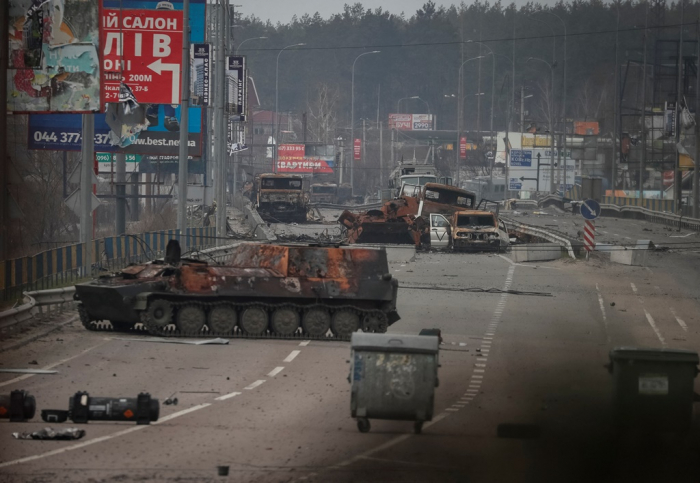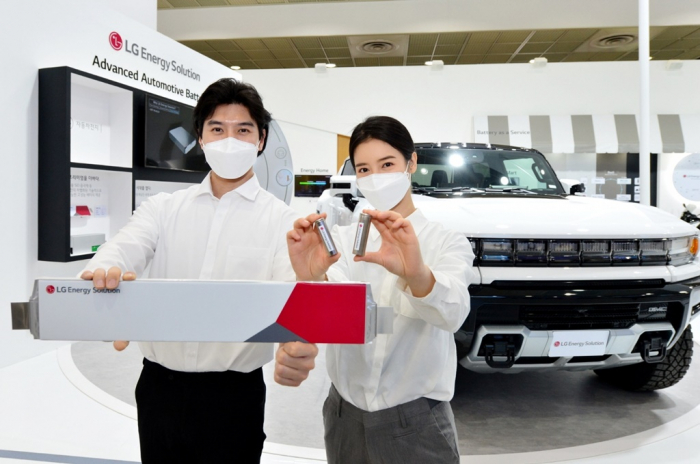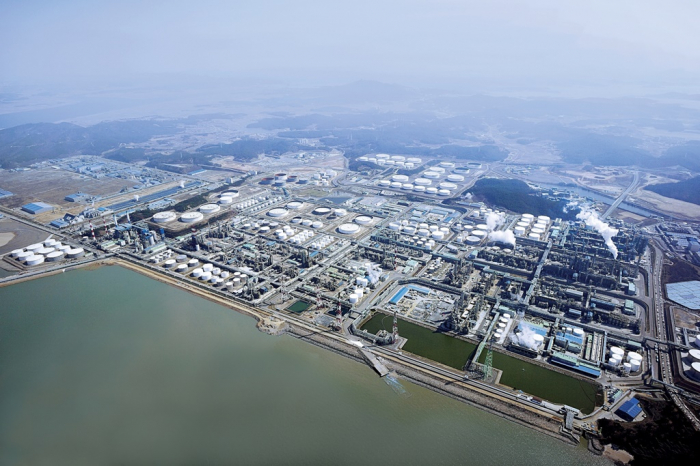Korea manufacturers see dismal Q1 after stellar profits in 2021
The total operating profit of the top 100 manufacturers nearly doubled last year, indicating their fundamentals are strong enough to improve earnings
By Apr 01, 2022 (Gmt+09:00)
LG Chem to sell water filter business to Glenwood PE for $692 million


Kyobo Life poised to buy Japan’s SBI Group-owned savings bank


KT&G eyes overseas M&A after rejecting activist fund's offer


StockX in merger talks with Naver’s online reseller Kream


Mirae Asset to be named Korea Post’s core real estate fund operator



South Korean companies, especially manufacturers, suffered surging commodity prices, a weak won currency and global logistics disruptions in the first quarter with their profits expected to fall amid the war in Ukraine.
That came after manufacturers in Asia’s fourth-largest economy reported strong earnings last year despite the pandemic thanks to preemptive investments and business portfolio diversification.
South Korea’s 131 listed companies were forecast to log a combined 36.4 trillion won in operating profit during the first quarter, according to financial information provider FnGuide Inc. on Thursday. This was 2.3 trillion won or 6% lower than a consensus of 38.7 trillion won predicted before Russia’s military attack on Ukraine.
The shipbuilding, petrochemical and semiconductor industries are expected to suffer more if the military conflict lasts longer, given their reliance on exports, analysts said.
WEAKER YEN
Other sectors such as the car industry have been concerned over the recent tumble in the Japanese yen that is expected to boost the price competitiveness of their rivals in the neighboring country.
“The weakening yen could undermine price competitiveness of some local industries. Profits at companies in these sectors are likely to fall in the short term,” said Lee Jae-soo, head of regional cooperation at the Federation of Korean Industries (FKI), a business lobby group.
The yen has fallen 5.2% against the dollar so far this year, while the South Korean won has eased 1.8%, according to Reuters. Earlier this week, the local currency hit its strongest level versus the Japanese unit in more than three years on higher interest rates and concerns over the weakening fundamentals of the world’s third-largest economy.
FKI’s Lee was not overly concerned about South Korean manufacturers’ long-term perspective.
“Compared to Japanese companies, domestic manufacturers’ competitiveness is pretty strong. They will be able to overcome the current crisis,” he stressed.
PROFITS NEARLY DOUBLE IN 2021
Last year, South Korean manufacturers’ operating profits nearly doubled.
The country’s top 100 manufacturers listed on stock markets by market capitalization excluding transportation, services, information technology, financial institutions and state-run firms posted a total of 132.9 trillion won in 2021, 91.6% up from 69.4 trillion won in the previous year, according to The Korea Economic Daily’s analysis.
Profits of the electronics and chemical sectors rose 26.6 trillion won and 11.4 trillion won, respectively, while the steel industry’s profit grew by 9.9 trillion won. The automobile and refining sectors’ profits also increased by 7.6 trillion won and 7.4 trillion won respectively.
The secondary battery, as well as bio and health sectors logged profit growth of 1.7 trillion won and 1.4 trillion won.
“The existing core sectors maximized productivity through cost cuts while emerging industries such as battery and new materials improved their constitutions with bold investments,” said a local business circle source.

1 TRILLION WON PROFIT CLUB
The number of manufacturers with operating profit of over 1 trillion won on the consolidated basis more than doubled to 23 in 2021 from 11 in the prior year.
In 2020, Samsung Electronics Co., SK Hynix Inc., LG Electronics Inc., POSCO, Hyundai Motor Co., Kia Corp., Hyundai Mobis, LG Chem Ltd., Hanwha Corp., CJ CheilJedang Corp. and LG Household & Health Care were members of the club with operating profit of more than 1 trillion won. Last year, Hyundai Steel, Kumho Petrochemical Co., LG Display Co., S-Oil Corp., SK Innovation Co., Lotte Chemical Corp., Samsung Electro-Mechanics, Hyosung TNC Corp., SD Biosensor Inc., LG Innotek, Korea Zinc Co. and Samsung SDI Co. joined the club.
Among them, Samsung Electronics reported the largest operating profit of 51.6 trillion won in 2021, followed by SK Hynix with 12.4 trillion won, POSCO with 9.2 trillion won, Hyundai Motor with 6.7 trillion won and Kia with 5.1 trillion won.
Samsung Electronics’ profit accounted for 38.9% of the total profits of the top 100 manufacturers last year, down from 44.7% in 2020.
“Earnings of industries hardly hit by the COVID-19 such as refining and automaking sectors significantly improved, while new businesses stabilized earlier than expected,” said another source at the domestic business circle.
HOLDING COMPANIES BENEFIT FROM AFFILIATES’ STRONG EARNINGS
Strong earnings of manufacturers helped some holding companies of the country’s conglomerates such as SK Inc., LG Corp., GS Holdings and Hyundai Heavy Industries Holdings report operating profits of more than 1 trillion won.
SK Inc. reported the largest profit of 4.9 trillion won among them thanks to the strong performance of SK Hynix and SK Innovation. The holding company of the country’s third-largest conglomerate SK Group invests in new sectors such as bio as its own business.
GS Holdings logged 2.6 trillion won in operating profit on healthy earnings from its refining subsidiary GS Caltex. Hyundai Heavy Industries Holdings posted a profit of 1.1 trillion won as strong earnings from its refining unit Hyundai Oilbank offset a loss from the group’s shipbuilding business.

SHIPBUILDING, CEMENT SECTORS SUFFER
On the other hand, the shipbuilding and cement industries failed to log profit due to the surge in raw material prices.
The Korean Big Three shipbuilders -- Korea Shipbuilding & Offshore Engineering Co. (KSOE), Daewoo Shipbuilding & Marine Engineering Co. and Samsung Heavy Industries Co. -- reported the largest losses among the 100 companies as they reflected higher production costs due to rising steel prices in provisions.
Industry sources, however, expected an improvement this year.
“The heavy losses last year were temporary mainly because of the provisions. We have secured works for two years thanks to an industry boom, earnings will significantly improve this year,” one of the sources said.
Ssangyong C&E Co. and Hanil Cement Co. reported smaller profits.
Write to Kyung-Min Kang at kkm1026@hankyung.com
Jongwoo Cheon edited this article.
-

-
 Shipping & ShipbuildingKorea shipbuilders to win mega tanker deals on rising LNG demand
Shipping & ShipbuildingKorea shipbuilders to win mega tanker deals on rising LNG demandMar 30, 2022 (Gmt+09:00)
3 Min read -
 MarketsKorea won at three-year high vs yen on rate differentials
MarketsKorea won at three-year high vs yen on rate differentialsMar 28, 2022 (Gmt+09:00)
2 Min read -
 War in UkrainePerfect storm from Ukraine crisis clouds Korea Inc.’s outlook
War in UkrainePerfect storm from Ukraine crisis clouds Korea Inc.’s outlookFeb 25, 2022 (Gmt+09:00)
4 Min read -
 War in UkraineKorean shipbuilders set for more orders on Ukraine crisis
War in UkraineKorean shipbuilders set for more orders on Ukraine crisisFeb 23, 2022 (Gmt+09:00)
3 Min read -

-
 EarningsSamsung’s 2022: Year of war on uncertainty, shaky supply chain
EarningsSamsung’s 2022: Year of war on uncertainty, shaky supply chainJan 27, 2022 (Gmt+09:00)
4 Min read -
 EarningsHyundai Motor vows $7.7 billion investment after record 2021 revenue
EarningsHyundai Motor vows $7.7 billion investment after record 2021 revenueJan 25, 2022 (Gmt+09:00)
4 Min read -



